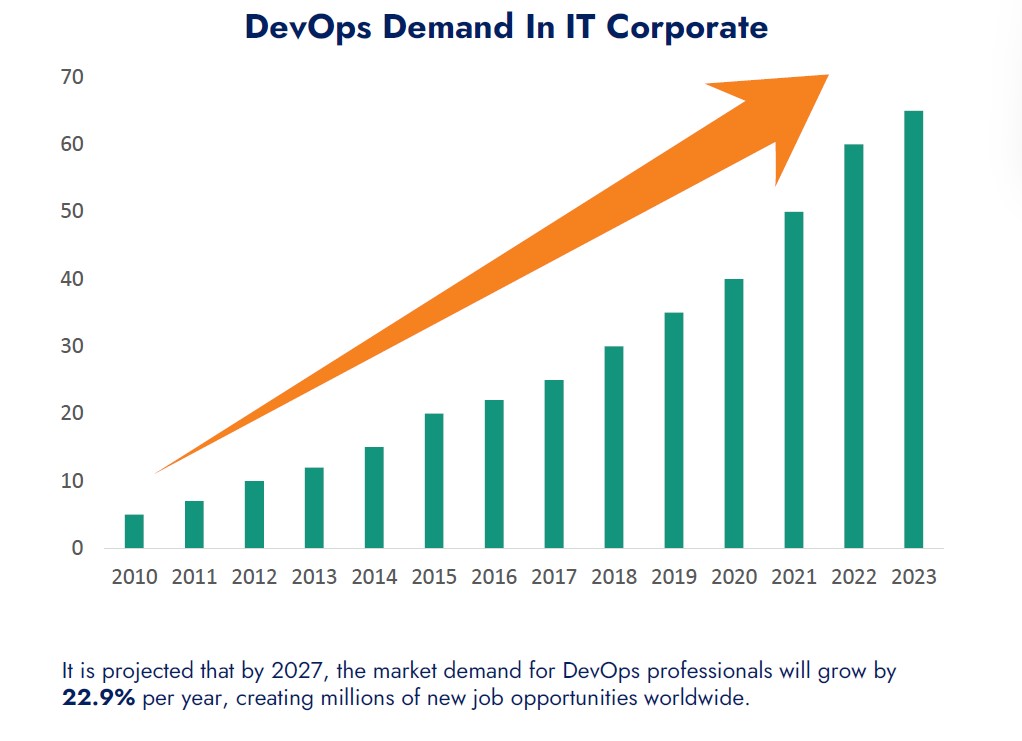The DevOps advance certificate program at BinaryBrains is designed to provide you with in-depth knowledge and hands-on experience in implementing DevOps practices.
You'll gain in-depth knowledge of various DevOps tools, including Git, Jenkins, Docker, Ansible, Terraform, Kubernetes, Prometheus, and Grafana. Our curriculum is tailored to help you master real-world DevOps scenarios in Continuous Development, Configuration Management, Continuous Integration, and Continuous Monitoring of software development life cycle.
With flexible learning options—both online (live instructor-led training) and offline — you will receive expert-led instruction, job assistance, and certification guidance to fast-track your career in DevOps.
This DevOps training course is designed to keep pace with the latest industry trends, equipping you with a strong foundation in essential DevOps tools, including Git, Maven, Jenkins, Docker, Ansible, Kubernetes, Prometheus, Grafana, and Terraform. The program emphasizes a hands-on learning approach, ensuring you gain practical experience with real-world applications. Structured to help you become a certified DevOps practitioner, this course provides in-depth training on best practices for Continuous Development, Continuous Testing, Configuration Management, Continuous Integration, Continuous Deployment, and Continuous Monitoring, covering the entire software development lifecycle.
By the end of this DevOps Course, you’ll be well-prepared to take on roles such as DevOps Engineer, Site Reliability Engineer (SRE), or Cloud Engineer, and drive innovation and efficiency in any organization.
In this DevOps course, you’ll master essential practices including Continuous Integration, Continuous Delivery, and Infrastructure as Code. Learn to manage version control with Git, build CI/CD pipelines, and automate configuration using tools like Ansible and Docker. Gain expertise in container orchestration with Kubernetes, and implement monitoring and security practices. By the end, you’ll be equipped with practical skills and a portfolio of real-world projects to excel in DevOps roles.
Our DevOps course is perfect for IT professionals, software developers, system administrators, and anyone looking to enhance their skills in automation, cloud management, and continuous deployment.
Completing a DevOps course opens doors to high-demand roles such as:
These positions offer opportunities in top tech companies and startups worldwide.
Topic 1
Topic 2 – GIT – Version Control System
Topic 3 – Jenkins
Topic 4 – Containerization using Docker
Topic 5 – Orchestration using Kubernetes
Topic 6 – Prometheus and Grafana
Topic 7 – Terraform
Topic 8 – Ansible
Enhance your professional profile with an industry-recognized Certificate of Course Completion that sets your portfolio apart.
Upon successful completion of your training program, you will receive an industry-recognized certificate that validates your expertise and practical skills. Our certificates are designed to enhance your professional credibility and showcase your proficiency in real-world applications of DevOps, Cloud Computing, and other technologies. Whether you’re applying for a new role, seeking a promotion, or strengthening your resume, this certificate demonstrates your commitment to continuous learning and technical excellence.
| Date | Training Mode | Batch | Duration | Price |
|---|---|---|---|---|
| 07-Feb-26 | Online & Classroom |
Weekends (Sat & Sun) 07:00 AM - 10:00 AM Morning Batch |
7 Weeks |
Online Price ₹16,499 45% OFF, Save ₹14,000 |
| 14-Feb-26 | Online & Classroom |
Weekends (Sat & Sun) 07:00 PM - 10:00 PM Afternoon Batch |
7 Weeks | |
| 16-Feb-26 | Online & Classroom |
Weekdays (Mon - Fri) 10:00 AM - 12:00 PM Morning Batch |
4 Weeks |
Classroom Price ₹19,799 45% OFF, Save ₹16,200 |
| 23-Feb-26 | Online & Classroom |
Weekdays (Mon - Fri) 06:00 PM - 08:00 PM Evening Batch |
4 Weeks |
The demand for DevOps professionals has surged dramatically over the past decade, driven by the rapid adoption of cloud technologies and agile development practices. In 2019, the global DevOps market was valued at approximately $3 billion. By 2023, this figure skyrocketed to over $12 billion, reflecting an annual growth rate of nearly 25%. As more corporations transition towards automation, continuous integration, and scalable infrastructure, the need for skilled DevOps engineers continues to climb.

After completing a DevOps course, several job opportunities become available depending on your Skills, Certifications, and Experience.
Below are common roles with their average salary packages.
| Job Role | Description | Average Salary (India) | Average Salary (US) |
|---|---|---|---|
| DevOps Engineer | Bridging development and IT operations, managing CI/CD pipelines, automating processes. | ₹8-₹15 LPA | $90,000-$140,000 |
| Cloud Engineer | Designing, planning, and managing cloud infrastructure using AWS, Azure, or Google Cloud. | ₹9-₹16 LPA | $100,000-$150,000 |
| Site Reliability Engineer(SRE) | Ensuring high availability and performance of production systems, automating reliability and monitoring. | ₹10-₹18 LPA | $95,000-$160,000 |
| Release Manager | Coordinating and managing product releases, ensuring smooth testing and deployment. | ₹10-₹14 LPA | $85,000-$130,000 |
| Automation Engineer | Automating repetitive tasks, setting up CI/CD pipelines, and optimizing processes | ₹8-₹12 LPA | $85,000-$125,000 |




Take the First Step into the Future with Cutting-Edge Tech Training and 100% Career Assistance!
Talk to our course counsellor now!